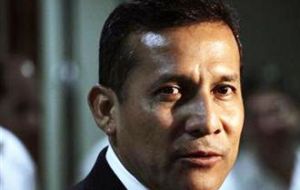MercoPress. South Atlantic News Agency
Peruvian peasants clash with police to protest against gold mine in the Andes
 A crucial test for President Humala
A crucial test for President Humala Peruvian police fired tear gas on Friday to break up a protest at Newmont Mining Corp's proposed 4.8 billion dollars Conga gold mine as the government tried to mediate a bitter environmental dispute over the project. Several protesters were injured.
Environmental activists said they would keep protesting until President Ollanta Humala holds a town hall meeting to address their fears that the mine would hurt nearby water supplies.
“This project isn't viable,” said the president of the region of Cajamarca, Gregorio Santos, who has led the protests.
Protesters and farmers say the mine would cause pollution and alter sources of irrigation water by replacing a string of alpine lakes with artificial reservoirs. The central government has called the environmental plan for the project sound. The company said it was exhaustively researched and designed according to strict standards.
The plan was also approved by the previous government but the impasse over the project, which would be the biggest mining investment in Peruvian history and create thousands of jobs, has become a crucial test for Humala.
The populist former army officer campaigned on promises to defuse persistent social conflicts over natural resources that have delayed billions of dollars in investments in Peru, which is one of the world's top minerals exporters.
Since taking office in July, he has tried to govern as a moderate who can help the rural poor while pleasing business. But some long-time supporters complain he has moved too far to the right by saying he is in favour of the mine.
Others say the anti-mining sentiment he faces runs deep and cannot easily be mediated in a country where provinces have long felt ignored by the central government.
“Companies come here, take the gold and then go away - just like in colonial times. People feel cheated,” said Jorge Rimarachin, a lawmaker from Cajamarca.
Nearly 500 years ago in Cajamarca the Spanish conquistador Francisco Pizarro captured the Incan emperor, Atahualpa, and as a ransom demanded a room full of gold and two rooms of silver.
The Incas handed over the precious metals but Pizarro killed Atahualpa anyway, Peruvian historians say. The room that held the gold is now part of a museum in Cajamarca.
“Everybody in Cajamarca knows the history of Pizarro. It's very present in the minds of the people,” Rimarachin said.
To calm disputes over natural resources nationwide, Humala has started to roll out social programs and raised taxes on mining companies to spread the wealth from a decade-long economic boom to the one third of Peruvians mired in poverty.
Though Humala says he wants to steer more of the national budget toward rural provinces, a large chunk of Peru's mining tax revenues are controlled by regional governments that often end up hoarding cash because they lack the administrative capacity to spend it on residents - an institutional weakness that analysts say hurts support for new mines.
The Conga project, which Newmont owns with Peruvian precious metals miner Buenaventura, would produce 580,000 to 680,000 ounces of gold a year and open in 2014. It has gold deposits worth around 15 billion dollars at current prices and sits 4,200 metres high in the Andes.
Nearby is Newmont's existing Yanacocha mine, which produced 1.5 million ounces of gold last year. It had a mercury spill in 2000 that still angers some local residents, though the company now runs extensive community development programs in the area.




Top Comments
Disclaimer & comment rules-

Read all commentsThe company and the government have done the exhaustive environmental assessment which both claim to be robust.
Nov 27th, 2011 - 09:15 pm 0The locals have doubts following an adjacent mercury spill into a watercourse some 11 years ago.
Locals NEED the confidence that they will not be poisoned and will have sufficient irrigation and drinking water. This is done by education, publicity and the state involvement.
The other argument is that they come, they exploit/despoil, then go leaving no permanent advantage to the regional society. This should be written it to the whole contract at the outset, and it almost certainly is. There needs to be an arbitration to determine if, today, the advantage accorded to the region is sufficient and that the checks and balances are in place to ensure that all that is promised comes to pass.
At the moment it is 'just' tear gas, but it could get worse - especially if it is 'stoked' by politics.
Time for Humala to 'get his hands dirty' and get personally involved.
Commenting for this story is now closed.
If you have a Facebook account, become a fan and comment on our Facebook Page!